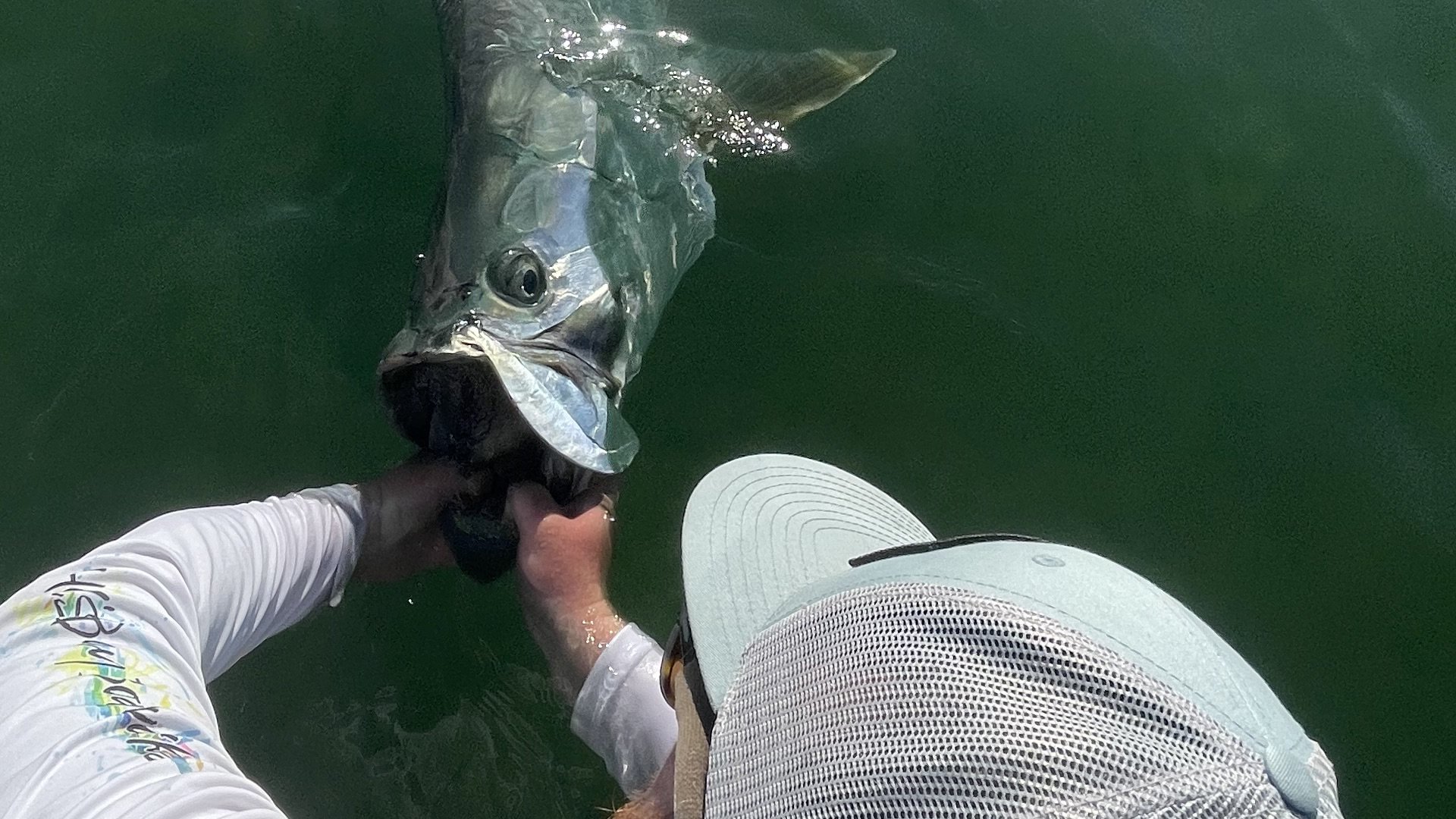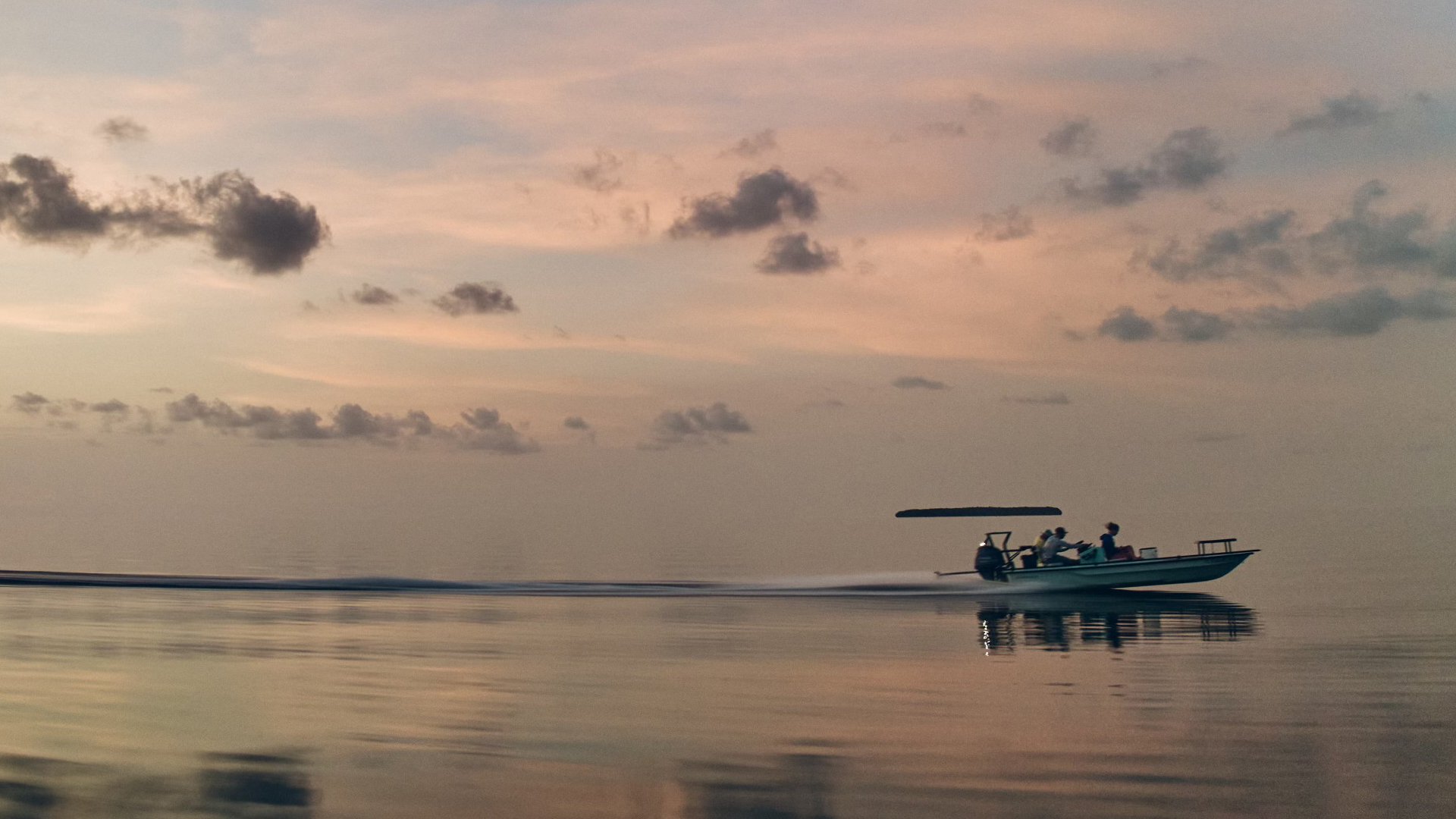
Fly Fish Key West For Tarpon
Key West and the Lower Keys are known in the fishing world as one of the premiere locations to fly fish for tarpon.
Tarpon have a well earned reputation among anglers as their favorite saltwater fish mainly because of their size, acrobatic displays, and their propensity to eat flies and baits. As spring ushers in warmer weather and the water temperatures are steadliy in the mid-70’s and above, tarpon appear in the Lower Florida Keys and Key West by the thousands to feed and rest before continuing their annual migration northward. Throughout the spring and early summer, tarpon can be found all over the Lower Keys laying up in the backcountry, rolling in current, moving along the banks of the Gulf of Mexico, and swimming the edges of the Oceanside flats. They can be caught frequently with conventional tackle, but most anglers know the appeal of catching them on a fly.
Tarpon Fly Fishing In Key West, FL
A day of tarpon fishing typically starts early. Long boat rides in the dark are the norm, as tarpon feed heavily at sunrise, and the need to beat other anglers to tarpon spots routinely exists. As the sun begins to rise, tarpon can be spotted rolling on the surface while gulping air, which makes audible sounds and disturbs the water surface. Rolling tarpon give clues to there behavior and movement that both guide and angler must note. As the guide quietly poles the boat towards the fish’s whereabouts, the angler is at the ready to make a cast at the guides discretion. Most shots at rolling tarpon are of the longer variety with shots over 80 feet in the wind being common. The objective is to get the fly as close to the fish’s face as possible with a subtle presentation, and stripped in a way that the fly is convenient enough for the fish to grab it. A well fished fly gets bit more often than not, and prepared anglers have a legitimate shot at jumping multiple tarpon per day.
As the sun rises and morning turns into day, tarpon rolling usually subsides, and when the conditions are right, the rest of the day is spent looking for laid up fish, or fishing swimming fish on the Oceanside. Laid up fishing is classic tarpon fly fishing and the thing that many fly anglers dream of. Usually earlier in the season (March-April) tarpon can be found in the backcountry basins floating motionless in 3-6 feet of water, many times right below the surface. Sneaking up to and presenting a fly quietly in the fish’s face will frequently result in utter chaos and a battle with a fish that is unmatched in the fly fishing world. If the laid up fish aren’t happening, migrating fish start to show up Oceanside in late April or early May. Groups of fish, sometimes numbering in the hundreds, make their way from key to key on their annual migration to the north. Oceanside tarpon fishing is a spectacle, and although these traveling fish aren’t the most prolific biters of flies, prepared anglers can catch them with a presentation that makes the fly naturally appear in the fish’s path.
A typical day of tarpon fishing is relatively exhausting and most days conclude between 1:00 and 3:00PM, depending on how early the start was. Not all tarpon fly fishing days are filled with perfect conditions and willing tarpon, and when conditions are not right for fly fishing for tarpon, time might be spent chasing permit and/or bonefish for a welcomed change of pace.
Key West Tarpon Fly Fishing Charter Details
Capt. Chandler Williams offers full day and half day Key West tarpon fly fishing trips and multiple boats are available for groups of more than 2 people. Contact us for current rates and availability. All trips include tackle/flies, fuel costs, launch fees, and a cooler with water and ice.
Payments And Deposits
Cash, Check or Venmo.
Credit cards through Venmo (additional service charges may occur)
$150 per day per guide deposit for all trips
Venmo or mail deposits to:
Chandler Williams
17A 12th Ave
Key West, FL 33040
What To Bring
Polarized sunglasses (amber, copper, and green lenses preferred)
Hat and any needed sun protection
9, 10, & 12 wt. rods (if own gear is preferred)
Quick drying clothing
Rain gear, jackets and pants
Shoes with non-marking soles
A positive attitude (most important part of having a successful trip)










